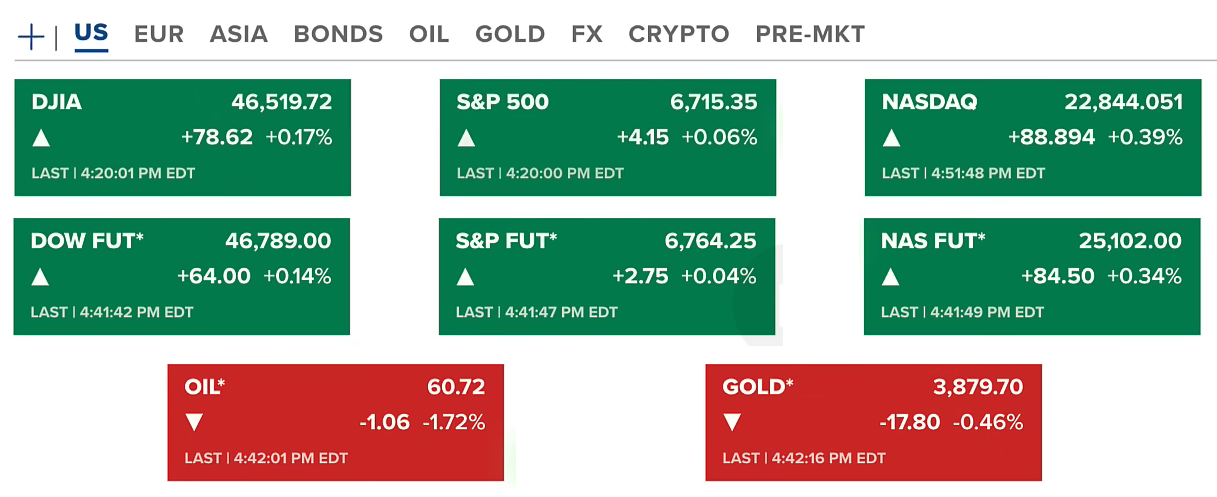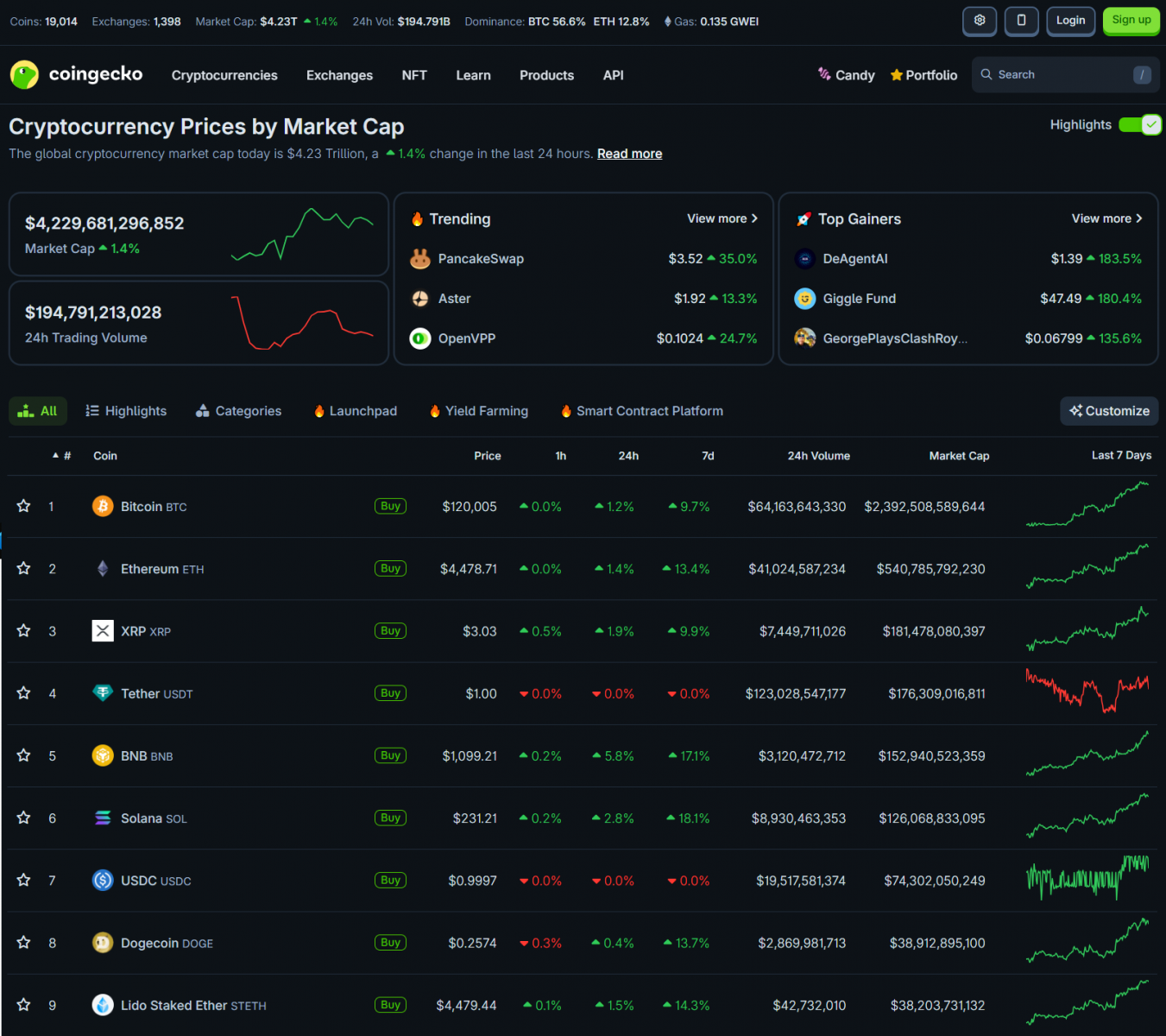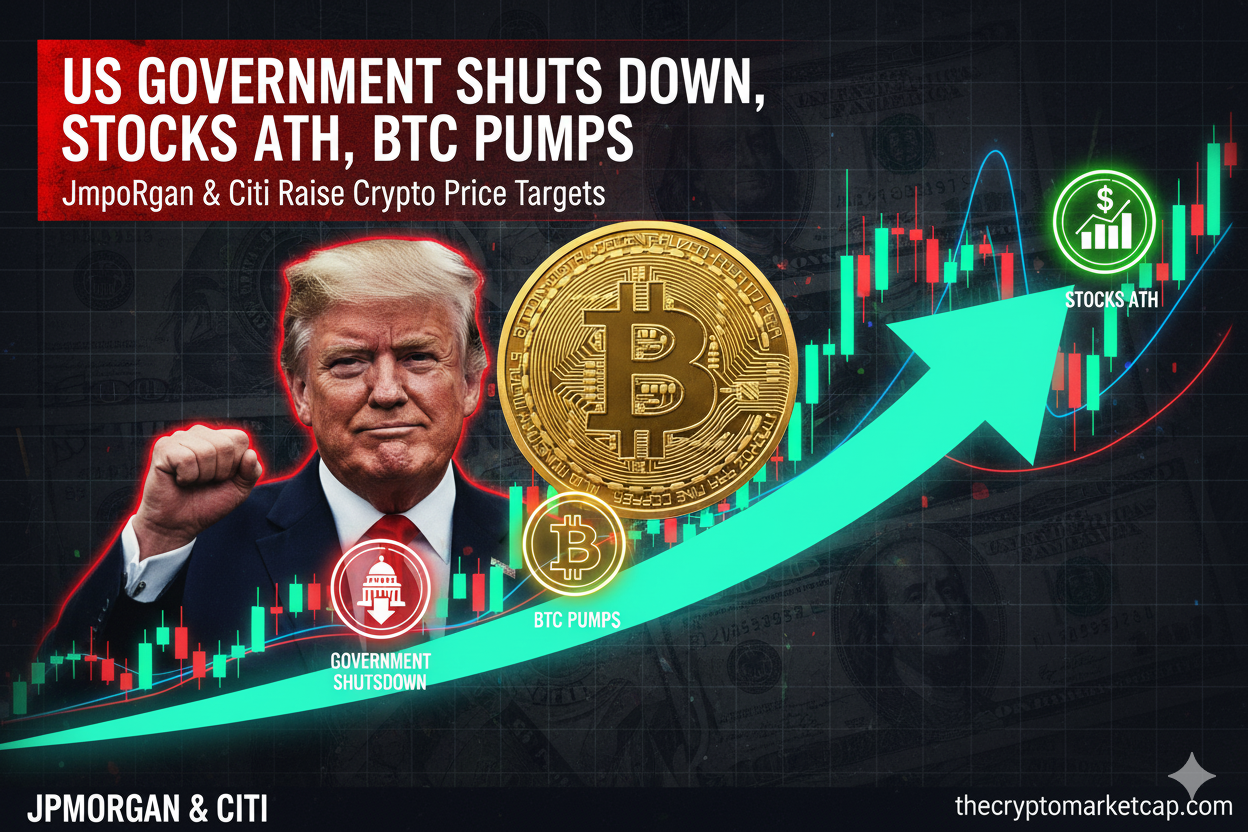The US government remains shut down, but the market continues to rally across both US stocks and crypto, with new optimistic forecasts for crypto being issued by major institutions.
Market Overview
US equities continued their growth on Thursday (October 2nd, US), with the Nasdaq leading the gains at 0.39%. Stock futures also showed an upward trend. Oil continued to decline to $60.7 per barrel. Gold saw a slight decrease but remained high at $3879 per ounce.

Bitcoin surged to $120,000, pulling most major altcoins higher. The overall crypto market capitalization increased to $4.22 trillion.

US BTC spot ETFs continued to see massive inflows on Thursday, totaling $627.2 million, driven by increased market optimism. ETH spot ETFs also saw $307.1 million in inflows. SOL saw a zero net flow.

If the US government shutdown persists, the approval process for other crypto ETFs will be delayed. The launch of new Spot Crypto ETFs could be directly affected because, under the SEC's shutdown plan, approval processes are temporarily halted. The market maintains an optimistic sentiment despite the lack of official data from the US Department of Labor, as investors believe the Fed will cut interest rates at its October 29th meeting. There is now a 97.8% probability that the Fed will cut interest rates this month, and a 91.5% chance of a further cut in December, bringing the rate down to 3.5–3.75%.
The employment report from the private company ADP showed negative figures, reinforcing the expectation that the Fed will have to loosen policy to support the economy. The US government shutdown could also impact GDP if prolonged, potentially forcing the Fed to act more aggressively. However, if the shutdown only lasts a few days, the impact will be negligible. President Trump views the shutdown as an opportunity to cut spending and push the two parties to reach an agreement to reopen the government. In the long run, previous shutdowns show that financial markets often rebound strongly after the government resumes operations, suggesting this is primarily political theater rather than a real risk to the economy.
Bullish Forecasts for Bitcoin Emerge
JPMorgan, a bank that was once strongly opposed to Bitcoin, now suggests that Bitcoin is undervalued compared to gold and could rise by about 40% to $165,000, based on a model adjusted for gold price volatility. They note that the "debasement trade"—the trend of buying Bitcoin and gold to hedge against fiat currency risk—is increasing, primarily due to capital flowing from retail investors into Bitcoin and gold ETFs, which is particularly active ahead of the US election. JPMorgan estimates that Bitcoin is currently nearly $50,000 below its fair value, driven by inflation fears, budget deficits, skepticism about the Fed, and declining confidence in fiat currencies. Meanwhile, Citibank raised its forecast, predicting that Bitcoin could reach $181,000 in the next 12 months, while Ethereum (ETH) could climb to $5,440, supported by staking and ETF demand.

Both banks believe that the crypto market remains in an uptrend and may no longer follow the traditional 4-year cycle, but instead, enter an extended growth period until next year. However, if a severe recession occurs, Bitcoin could drop to $83,000. Overall, both JPMorgan and Citibank maintain a bullish stance on Bitcoin and Ethereum for the next 12 months.
US Crypto Policy & Infrastructure Development
Representative Nick Begich argues that the US should not only hold gold but also add Bitcoin to its national reserves. He and Senator Cynthia Lummis have proposed the Bitcoin Act, recommending the US government purchase 1 million BTC within the next five years. This plan is designed to be "budget-neutral," meaning it would not create additional tax burdens for citizens. The idea is inspired by President Donald Trump's previous executive order, which proposed that Bitcoin seized by the US government be converted into permanent reserve assets, similar to gold.

Meanwhile, CME Group—the world's largest derivatives exchange—just announced plans to launch a 24/7 crypto derivatives trading platform in early 2026, pending regulatory approval. This is considered a major turning point, as CME currently halts trading on weekends, holidays, and outside regular business hours. According to the CME CEO, the demand for continuous trading is surging, and the crypto market is the most suitable sector to begin with. However, the approval process from the CFTC is currently stalled due to the US government shutdown, and this process will be on hold until the budget is approved.
In another development, Sui Group, a Nasdaq-listed digital asset management company, announced it will launch two stablecoins, suiUSDe and USDi, on the Sui blockchain by the end of 2025. The project aims to increase liquidity, expand applications within the Sui ecosystem, and reduce reliance on popular stablecoins like USDC or USDT. USDi will be 1:1 backed by BlackRock's tokenized money market fund (BUIDL), ensuring stability and security. suiUSDe is a synthetic stablecoin from Ethena Labs, allowing investors to benefit from reserve assets that are reinvested into SUI tokens to boost ecosystem growth. This stablecoin maintains its price peg near $1 not through fiat reserves, but based on crypto assets like ETH or staked ETH. To neutralize price volatility, the protocol opens short positions in the derivatives market to hedge the risk, creating a delta-neutral state. Profits and losses are balanced, and the system can generate yield from funding rates and basis spreads, forming a stable income stream for holders.
Other Key Crypto & Market Updates
Spanish bank BBVA has partnered with SGX FX (Singapore) to allow retail customers to trade Bitcoin and Ethereum directly, marking the first time a European bank has used SGX FX's crypto infrastructure. Transactions will occur 24/7 on the same system BBVA uses for foreign exchange, with full pricing, risk management, and distribution tools. BBVA, one of Europe's largest banks with over $750 billion in assets, notes that customer demand for crypto is growing rapidly and that digital assets are becoming a core part of global finance.
Two Swedish members of parliament, Dennis Dioukarev and David Perez, proposed establishing a strategic Bitcoin reserve fund to hedge against inflation, diversify national assets, and show openness to digital technology. They argue that Sweden needs to participate in the "digital arms race" as the US and many other countries have begun accumulating Bitcoin. Funding could come from seized Bitcoin, but the regulating body is yet to be determined. The two MPs also called on the government not to issue a CBDC to avoid expanding the central bank's power. Although Sweden does not currently hold official Bitcoin reserves, the country has laws allowing the seizure of digital assets in criminal cases. The Swedish Democrats, the party making the proposal, are the second-largest party in parliament and hold strong influence in the governing coalition.
Polymarket, a prediction market platform on the Polygon blockchain, is preparing to reopen to US users after being banned by the CFTC for nearly four years. The company acquired QCX LLC for $112 million, giving it a Designated Contract Market (DCM) license that allows it to self-certify prediction markets. After receiving a "no-action" letter from the CFTC in early September, Polymarket is allowed to resume operations, with sports and election contracts expected to be listed starting October 2, 2025.
Sources
- Bloomberg
- CoinDesk
- U.S. Treasury
- TradingView
- Reuters
- SEC
- White House Press Office
- CME Group Official Announcements
- JPMorgan Research
- Citibank Research
- Sui Group Official Announcements
- BBVA Official Announcements
- Polymarket Official Announcements
- Solana Foundation
Disclaimer
This article is for informational purposes only and should not be considered financial advice. Please do your own research before making investment decisions.


.png)





